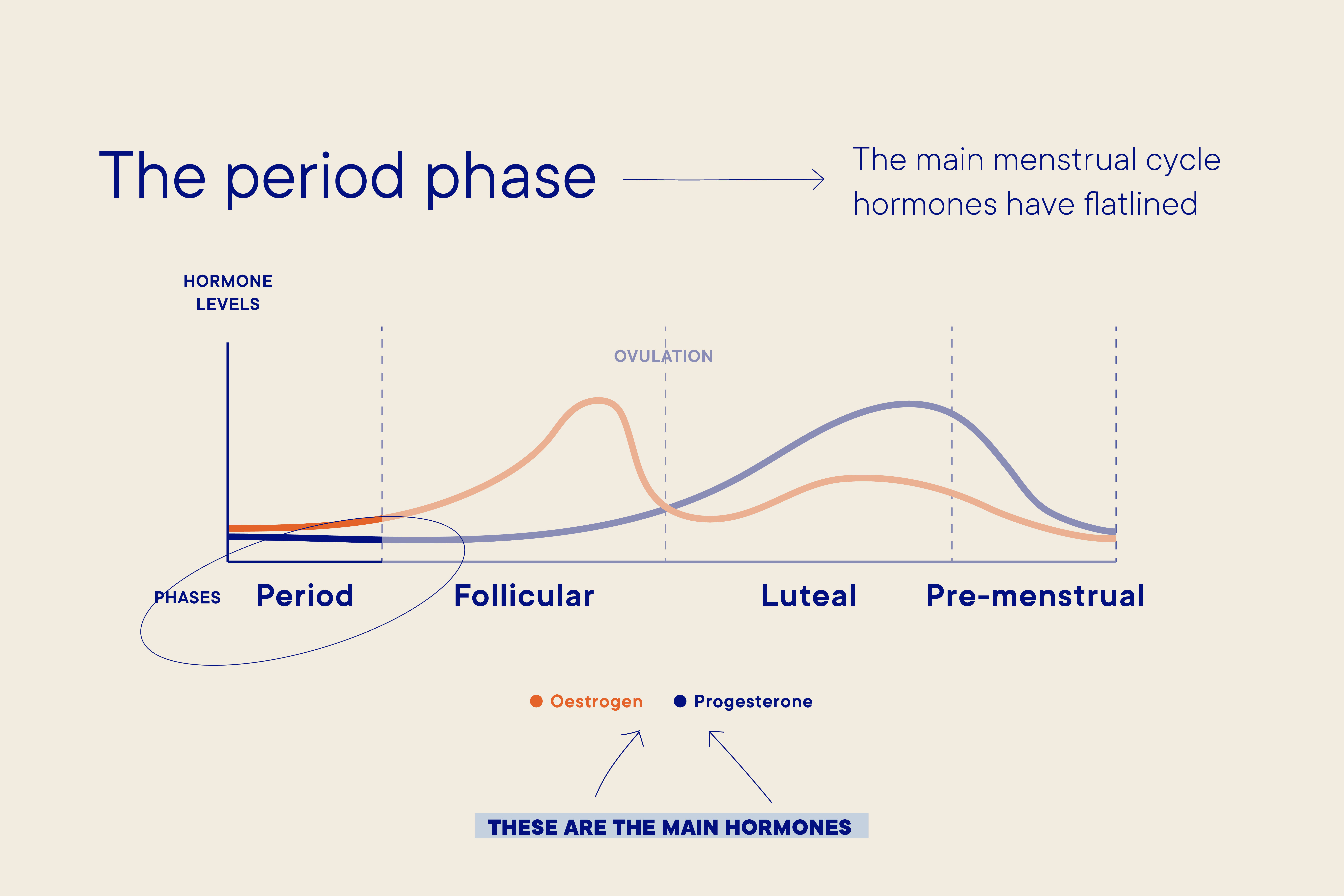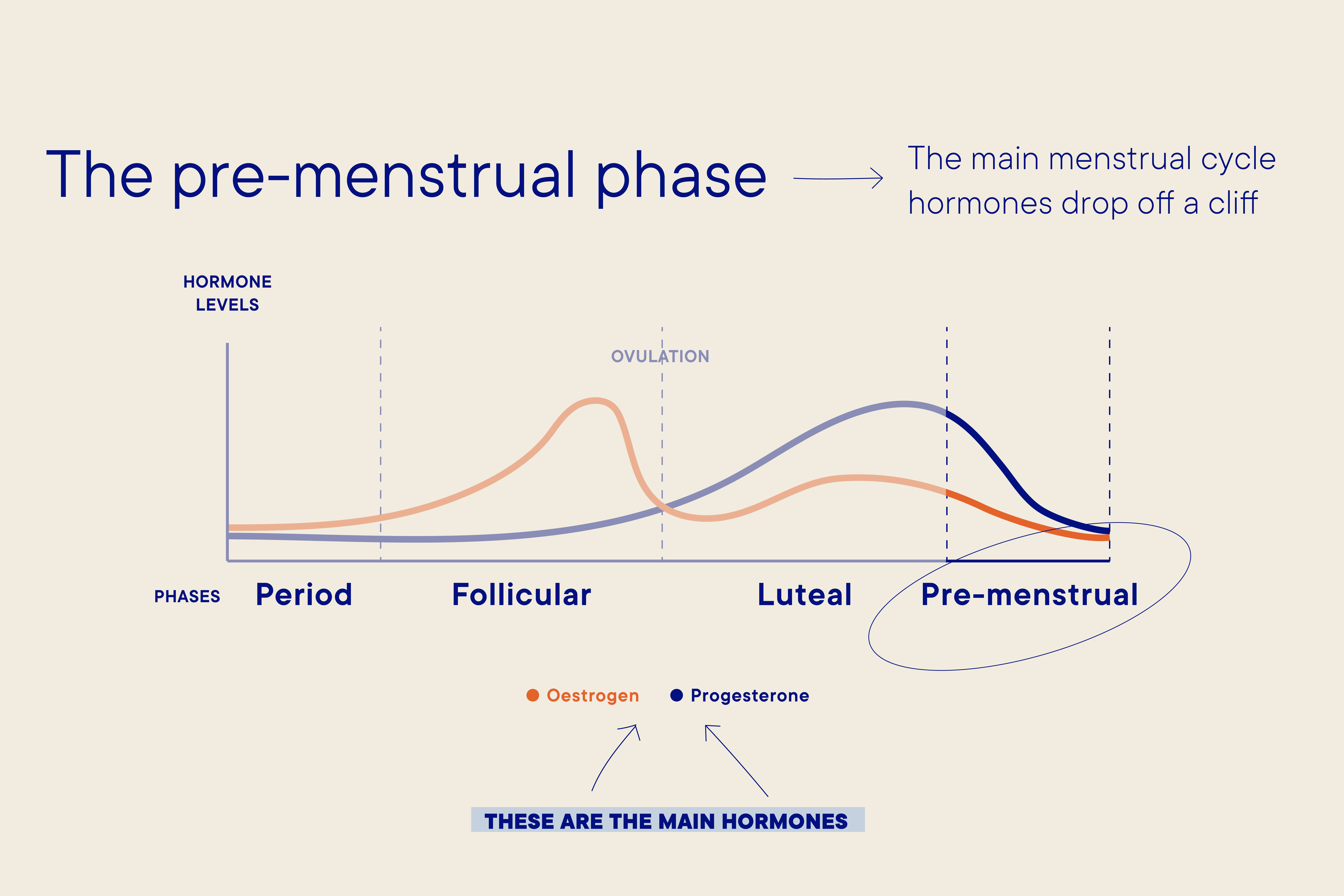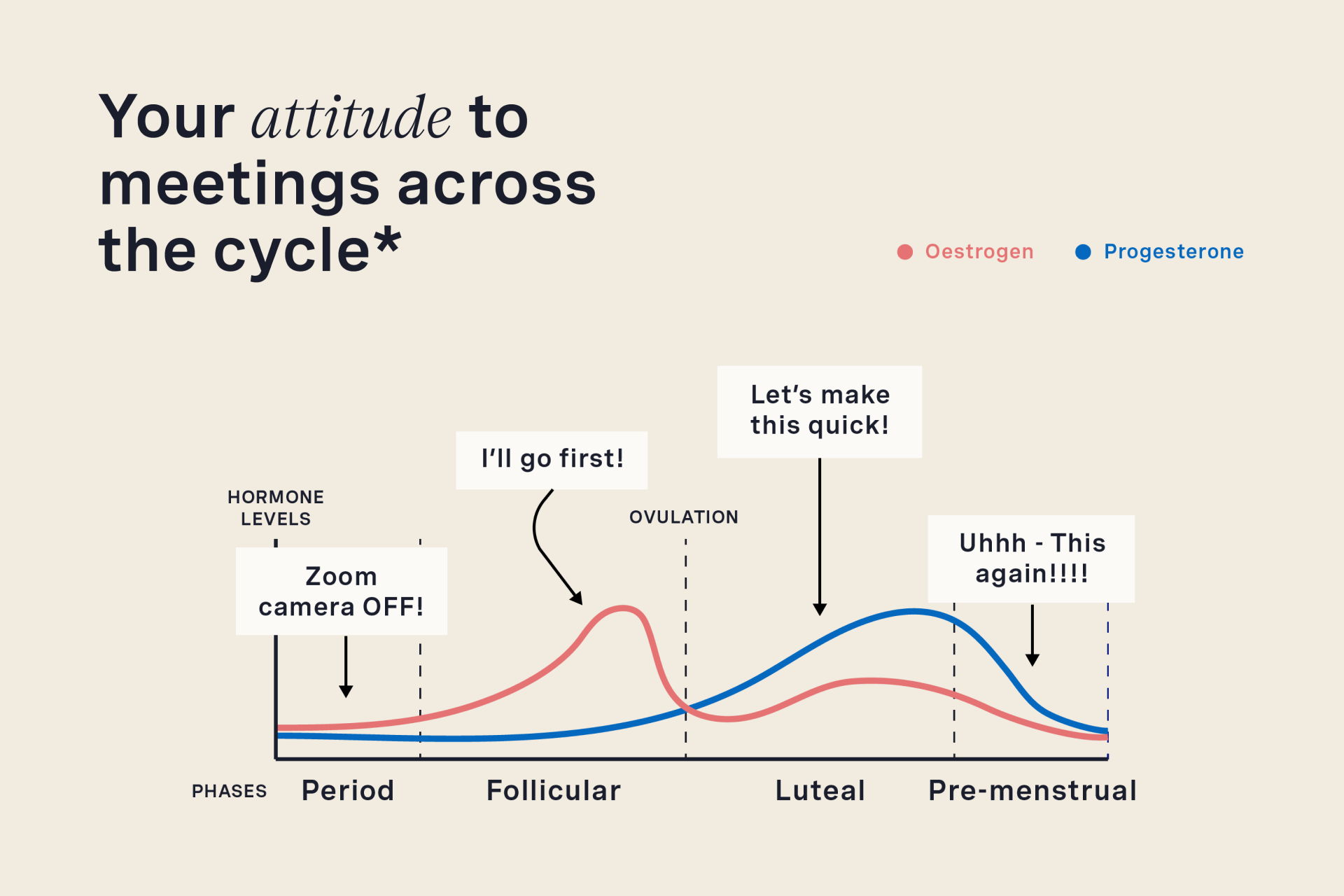How to work with your menstrual cycle to feel like a boss at work
a year ago
Cycle syncinga year ago
Cycle syncing
From payrise negotiations to presentations, Jennis physiologist Dr Emma Ross explains why strategically planning your work schedule around the four phases of your menstrual cycle can be a gamechanger for productivity…
Do you ever have those dream work days where you sail through Zoom meetings, win over all your colleagues with your sparkling charisma and blitz your to-do list with total ease? Then, just a few days later when you *really* need to focus, you’re so low on energy that it feels like a chore to simply get through your emails?
If you have a period, this fluctuation in productivity isn’t just pure coincidence - it could be down to your natural menstrual cycle and the hormonal changes that come with it.
To help us understand exactly what’s going on, plus when we should hire, fire and ask for that payrise, we chat to Jennis physiologist Dr Emma Ross to find out more.
Periods can be a bit of a mystery at the best of times, and one of the biggest misunderstandings is that there are just two parts to the monthly cycle: the time when you’re bleeding and the time when you’re not. In reality, it’s a little more complex than that.
Each month, various hormones do a synchronised dance through your body to create a month-long menstrual cycle that has four distinct phases. Changing levels of hormones like oestrogen and progesterone in every part of your cycle have a physiological and psychological impact throughout the month, making some work tasks more difficult than others.

What’s happening hormonally? The first week of your cycle is when you’re having your period or bleed. Dr Emma explains that because the egg from your last cycle wasn’t fertilised, “levels of the hormones oestrogen and progesterone drop as your uterine lining sheds.” This is where chemicals called prostaglandins come into play to trigger the muscles in your uterus to contract.
How it affects your productivity at work: Thanks to those pesky prostaglandins, the period phase is when you most likely to encounter abdominal pain and cramps ( 84% of us experience them) which can make socialising, team leading and general focus more of a challenge. Add to this other niggling symptoms like fatigue, tiredness and mood swings and it’s no surprise that your period phase (which lasts 5 to 6 days, on average) can be tricky to juggle alongside deadlines. There are ways to hack what’s happening, as we discover later…

What’s happening hormonally? The follicular phase is the stage of your menstrual cycle when your body is preparing to release an egg. “Around the second week of your period, signals from the brain tell the hormone, oestrogen, to be released, which then starts to rise up to its peak in preparation for ovulation,” reveals Dr Emma. Oestrogen is known for giving you energy, confidence and motivation, so you can imagine what it can do for your attitude to work and your colleagues.
How it affects your productivity at work: Think of the follicular phase as that elusive, golden period where you become a productivity ninja at the office. “The important thing to know during this phase is that oestrogen is rising, which makes you feel at your most motivated, most social, and most emotionally resilient,” Dr Emma notes.

What’s happening hormonally? Know as the ‘rest and nest’ phase, the major hormone in your body at this point in your cycle is progesterone, which has a calming, anti-anxiety effect on the brain. Oestrogen is still doing its thing, but at lower levels than in your follicular phase.
With a bit of forward-planning and some new-found understanding, you can hack your monthly hormones to supercharge your work schedule
How it affects your productivity at work: During this week, Dr Emma explains that with progesterone taking over from oestrogen, you can get a “dip in energy”, which means you’re more inclined to gravitate towards “slower, steady-state tasks”. Think: writing briefs, preparing reports and planning presentations.

What’s happening hormonally? Oestrogen and progesterone have been steadily rising in your body over the first half of the month, making you feel great, but as you get nearer to your period, they start to drop-off, fast. Because power-player oestrogen and laid-back and relaxed progesterone drop off a cliff, some people refer to this as ‘hormone withdrawal.'
How does it affect your productivity? Common PMS symptoms we all know and ‘love’ - like mood swings, bloating, fatigue and anxiety - happen in the days after ovulation because oestrogen and progesterone levels begin falling dramatically (if you’re not pregnant).
Oestrogen has a pretty strong effect on serotonin , the body’s natural happy hormone, and the anti-anxiety effects of progesterone start to tail off too, so it’s no wonder that you can feel more upset, anxious and irritable in the run up to your bleed days.
There’s no getting around the fact that there are certain points in your cycle where your hormones might not be helping you out work-wise. But with a bit of forward-planning and some new-found understanding, you can hack your monthly hormones to supercharge your work schedule… or at least be a bit kinder to yourself if you’re not firing on all cylinders. Here’s how to do just that…
“In the world of sport, oestrogen is the hormone that motivates us to train hard - and it’s the same in work,” explains Dr Emma. “The follicular phase is when we’re more likely to feel like social butterflies, which might lend itself to better communicating our case for a payrise. We’re also more emotionally resilient during this phase, so if your pay review doesn’t go as planned, it’s less likely to derail your whole day.”
You can use your pre-menstrual phase to your advantage, using the time to prioritise all the solo activities that you usually put off
High oestrogen levels during the follicular phase make you feel more outgoing and confident too, making it a great time to deliver a nerve-wracking work presentation or take the lead on a project or pitch.
Admin is never the most exciting of tasks, but hey, there are times in the month where you’ll want to dial things down a bit. “Some women in their pre-menstrual phase might feel overwhelming anxiety because of the drop in hormones, which can make it the time when you’re most likely to doubt yourself,” says Emma.
On the bright side, if you aren’t feeling like Captain Sociable, you can use your pre-menstrual phase to your advantage, using the time to prioritise managing your diary, booking travel, filing your emails, filling in employee reviews – and all the other solo activities that you usually put off.
“Research shows that creativity can peak around the middle of your cycle,” says Emma, making the luteal phase a great time to brainstorm out-of-the-box ideas and solutions. “If you’re leading a team, be mindful that not everyone is going to bring their most creative selves to the table, especially if they’re at different points of their cycle.”
If this is the case, you might need to take the lead on coming up with exercises and strategies for helping everyone to ideate.
You might not have consciously clocked it, but coffee meetings often feel best during your follicular phase. “If we think of it in evolutionary terms, our bodies release high levels oestrogen in the follicular phase to motivate us to go out and find a mate, as we are about to ovulate,” Emma reveals.
While we might not necessarily be on the lookout for a new partner every month, these evolutionary social benefits still apply, so the follicular phase is a great time to meet new business clients and dazzle them with your sparkling chat.
Some days on your period you can feel amazing, but other days you have to work a bit harder to show up as the best version of yourself. Unfortunately, you can’t always control when your PMS symptoms are going to strike, but there are simple strategies to help you get through difficult work tasks during the pre-menstrual and period phases.

Fear of public speaking is a pretty common anxiety, but presenting can feel even more nerve-wracking in the days after ovulation as progesterone levels drop.
“Factoring in some gentle movement is always a good idea, as exercise releases endorphins, which are nature's mood elevator and painkiller,” advises Dr Emma. “Some people might find high-intensity exercise really energising, but for others, it might be a yoga flow that really centres them and helps them be mindful of negative thoughts. It’s also a good way to shake off any nerves, whatever time of the month you are in.”
Before heading into any negotiation, acknowledge that your hormones are playing a part in any nerves or mood changes
You should also keep an eye on what you’re drinking. “Caffeine can be really bad for some people’s period pain and can make you feel jittery and anxious if you’re in your pre-menstrual phase when anxiety can strike. If that sounds like you, I’d suggest reducing your caffeine intake and sipping on water and herbal tea before you go into present,” advises Dr Emma. “That way you’ll be more relaxed and less amped up on angst.”
Whether you’re in an internal meeting or a client pitch, negotiation requires patience, focus, listening and confidence. If your pre-menstrual hormone dip is making you feel irritable, emotional and full of self-doubt, this can be trickier than usual.
“Before heading into any negotiation setting, acknowledge that your hormones are playing a part in any nerves or mood changes,” advises Emma. “Putting on your headphones for 10 minutes before a meeting and listening to some really uplifting music can help to shift your mindset, as can walking round the block ahead of a long call.”
Networking like a pro is all about making meaningful connections, which can be tough when all you want to do is crawl into bed and nap off your period fatigue or hibernate when the PMSing is hitting you hard.
“Getting enough sleep is really important for replenishing your social energy,” says Dr Emma. “During your period week and the days leading up to it, you might think about canceling social plans and pushing back big projects so you can focus on getting quality rest and saving your energy for the workie things that you need to prioritise.”
When it comes to periods, our self-talk matters. “There's some really positive research around self-compassion, and how it’s a skill that we can all learn,” says Dr Emma. “In the moments where we’re doubting ourselves, it’s a really good tool to use.”
Self-compassion is about talking to yourself as you would talk to your friends. “If your friend was upset about how a meeting went, you’d comfort them and point out all the various other ways that they’re great at the job,” says Emma.
Some people find that journaling is another helpful tool that enables them to write down, process and reframe their emotions - especially when it comes to difficult conversations and confrontation scenarios.
Menstruation affects every woman differently and no two periods are the same, but by learning about the times in your cycle when it can negatively affect your work performance, you can take control of the symptoms.
While your menstrual cycle will never adjust to suit your busy schedule, a bit of forward-thinking can help you tailor workflow to what’s happening hormonally or help you feel less guilty when you aren’t employee of the month because of what’s happening with your monthlies.
Read more about Dr Emma Ross
 Cycle syncing
Cycle syncing Perimenopause
Perimenopause Perimenopause
Perimenopause Perimenopause
PerimenopauseSign up to learn everything you need to know about CycleMapping, plus how you can live better and feel better through optimising your fitness to you.
This website uses cookies to ensure you get the best experience on our website. Learn more

Sign up for the very latest news on women's fitness, health and hormones, plus be the first to receive exclusive offers and extras